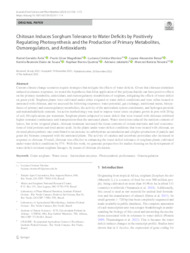Chitosan induces sorghum tolerance to water deficits by positively regulating photosynthesis and the production of primary metabolites, osmoregulators, and antioxidants.
Chitosan induces sorghum tolerance to water deficits by positively regulating photosynthesis and the production of primary metabolites, osmoregulators, and antioxidants.
Author(s): ÁVILA, R. G.; MAGALHAES, P. C.; VITORINO, L. C.; BESSA, L. A.; SOUZA, K. R. D. de; QUEIROZ, R. B.; JAKELAITIS, A.; TEIXEIRA, M. B.
Summary: Current climate change scenarios require strategies that mitigate the efects of water defcits. Given that chitosan stimulates induced resistance responses, we tested the hypothesis that foliar application of this polysaccharide can have positive efects on the primary metabolite, antioxidant, and osmoregulatory metabolisms of sorghum, mitigating the efects of water defcit on grain yield. Sorghum plants were cultivated under either irrigated or water-defcit conditions and were either treated or untreated with chitosan, and we assessed the following responses: water potential, gas exchange, nutritional status, biosynthesis of primary and osmoregulatory metabolites, the activity of the antioxidant system constituents, and hydrogen peroxide and malondialdehyde contents. An active methodology was used to impose water stress on plants grown in pots with 20 kg of soil, 06 replications per treatment. Sorghum plants subjected to water defcit that were treated with chitosan exhibited higher stomatal conductance and transpiration than the untreated plants. Water restriction reduced the nutrient contents of leaves, but in the irrigated plants, chitosan treatment increased the tissue contents of certain nutrients and leaf concentrations of total proteins and total amino acids. In the plants under water-defcit conditions that were treated with chitosan, an elevated photosynthetic rate contributed to an increase in carbohydrate accumulation and a higher production of panicle and grain dry biomass compared with the untreated plants. The activity of catalase and ascorbate peroxidase also increased in response to chitosan. Overall, chitosan was efective in enhancing the water defcit tolerance of sorghum plants cultivated under water-defcit conditions by 57%. With this work, we generate perspectives for studies focusing on the development of water-defcit-resistant sorghum lineages, by means of chitosan elicitation.
Publication year: 2023
Types of publication: Journal article
Unit: Embrapa Maize & Sorghum
Observation
Some of Embrapa's publications are published as ePub files. To read them, use or download one of the following free software options to your computer or mobile device. Android: Google Play Books; IOS: iBooks; Windows and Linux: Calibre.
Access other publications
Access the Agricultural Research Database (BDPA) to consult Embrapa's full library collection and records.
Visit Embrapa Bookstore to purchase books and other publications sold by Embrapa.

